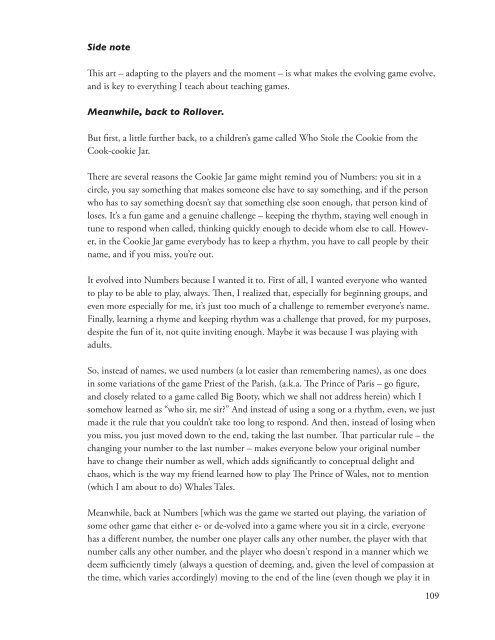A-Playful-Path_DeKoven-web
A-Playful-Path_DeKoven-web
A-Playful-Path_DeKoven-web
Create successful ePaper yourself
Turn your PDF publications into a flip-book with our unique Google optimized e-Paper software.
Side note<br />
This art – adapting to the players and the moment – is what makes the evolving game evolve,<br />
and is key to everything I teach about teaching games.<br />
Meanwhile, back to Rollover.<br />
But first, a little further back, to a children’s game called Who Stole the Cookie from the<br />
Cook-cookie Jar.<br />
There are several reasons the Cookie Jar game might remind you of Numbers: you sit in a<br />
circle, you say something that makes someone else have to say something, and if the person<br />
who has to say something doesn’t say that something else soon enough, that person kind of<br />
loses. It’s a fun game and a genuine challenge – keeping the rhythm, staying well enough in<br />
tune to respond when called, thinking quickly enough to decide whom else to call. However,<br />
in the Cookie Jar game everybody has to keep a rhythm, you have to call people by their<br />
name, and if you miss, you’re out.<br />
It evolved into Numbers because I wanted it to. First of all, I wanted everyone who wanted<br />
to play to be able to play, always. Then, I realized that, especially for beginning groups, and<br />
even more especially for me, it’s just too much of a challenge to remember everyone’s name.<br />
Finally, learning a rhyme and keeping rhythm was a challenge that proved, for my purposes,<br />
despite the fun of it, not quite inviting enough. Maybe it was because I was playing with<br />
adults.<br />
So, instead of names, we used numbers (a lot easier than remembering names), as one does<br />
in some variations of the game Priest of the Parish, (a.k.a. The Prince of Paris – go figure,<br />
and closely related to a game called Big Booty, which we shall not address herein) which I<br />
somehow learned as “who sir, me sir?” And instead of using a song or a rhythm, even, we just<br />
made it the rule that you couldn’t take too long to respond. And then, instead of losing when<br />
you miss, you just moved down to the end, taking the last number. That particular rule – the<br />
changing your number to the last number – makes everyone below your original number<br />
have to change their number as well, which adds significantly to conceptual delight and<br />
chaos, which is the way my friend learned how to play The Prince of Wales, not to mention<br />
(which I am about to do) Whales Tales.<br />
Meanwhile, back at Numbers [which was the game we started out playing, the variation of<br />
some other game that either e- or de-volved into a game where you sit in a circle, everyone<br />
has a different number, the number one player calls any other number, the player with that<br />
number calls any other number, and the player who doesn't respond in a manner which we<br />
deem sufficiently timely (always a question of deeming, and, given the level of compassion at<br />
the time, which varies accordingly) moving to the end of the line (even though we play it in<br />
109


